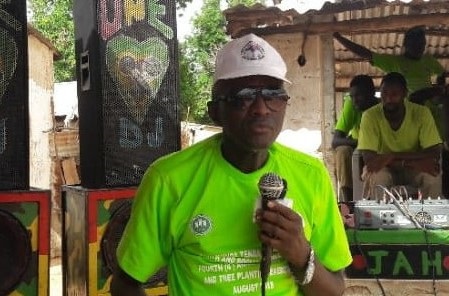Governor of North Bank Region (NBR) in The Gambia, Ebrima Dampha, has reiterated his government’s call for the restoration of the disappearing vegetation cover of the region through the planting of indigenous and utility trees as a token of heritage for the coming generation.

With the reality of the fast approaching of the Sahara Desert, he said restoration of the cover has become a compelling demand for an integrated approach.
Dampha make this call during the fourth annual tree planting and cleansing exercise organised by the National Environment Agency (NEA) and Kani-Kunda Tenda Youth and Social Development Association (KTYSDA) held in that Sanjally village, North Bank Region.
The Governor planted the first mahogany seedling, followed by the village Alkalo marking the beginning of the planting party. All other institutions present were given the opportunity to plant a tree on behalf of their institutional heads officially marking the beginning of the massive planting with technical support from staffers of Forestry Department. The exercise was graced with melodious traditional drum beat and dancing by the visiting traditional group from Jarra Pakalinding.
The Governor urged the community to jealously safeguard the forest for the benefits of the entire region and the country at large and gave assurance to support the association to improve the region’s tree population. Dampha added that government cannot do it all and theirs is an example of complementing government`s effort, while urging other communities to emulate them.
The Governor further called on the community to take ownership of their own development and bear in mind that peace has no substitution on Earth. He finally declared the session open and wished them a very fruitful ceremony and many more in advance in peace, progress and prosperity.
According to the village Alkalo, Lamin Naban, their local institutional by-laws helped them a lot in their conservation scheme, and that thanks to the understanding of the habitants, an integrated approach has been devised to curb some of the local menaces. He thanked the youths for their giant steps that they have taken to date and also thanked the NEA for their continuous support and collaboration.
NEA`s Programme Officer for Environmental Education & Communication, Sheikh Alkinky Sanyang, advised that all the transplanted seedlings must be protected from both human and animal intrusion, and further called for a higher survival rate of the newly planted seedlings by protecting them from both human and animal intrusion.
He spoke on the importance of tree planting and its essence to human life and the environment. He stressed that felling of trees for charcoal production, forest fires and other unsustainable utilisation of forest resources greatly contributed to the effects of climatic change which affects human livelihood, the eco system and the environment in general.
He warned that “No tree, No Life”, signaling that the felling of a single big tree results in the death of many other smaller ones as it falls on them. Trees trap carbon dioxide released from human and carbon monoxide by vehicles serving as a carbon sink, he pointed out.
He finally warned the community that the ban on plastic bags still holds and soon there will be a massive campaign and enforcement and those found wanting will be dealt accordingly. He informed the gathering that plastics cause a lot of harm to human health, marine lives, environment, and agriculture, animals.
This he attributed to two toxic chemicals (dioxin and furan) that are used in the production of plastic bags and that the two chemicals are among the 12 chemicals called Persistent Organic Pollutants (POPs) which were banned globally due to their impact on human health and the environment.
In his farewell speech, the Association`s outgoing President, Lamin Saidy, said the main aim of the activities is to foster more collaboration and corporation amongst community members and bring development to their village. In this edition, he said over 3,000 seedlings were transplanted within the community forest and further promised that they will jealously protect them from bushfires.
He concluded by informing the gathering that the essence of the annual tree planting is to mitigate climate change by increasing the carbon print contribution.
Every year the youth association organises a tree planting and cleansing exercise where many utility and food trees are planted in the community woodlot and forest, while the protection schemes for the newly transplanted seedling are strategised.
By Sheikh Alkinky Sanyang
